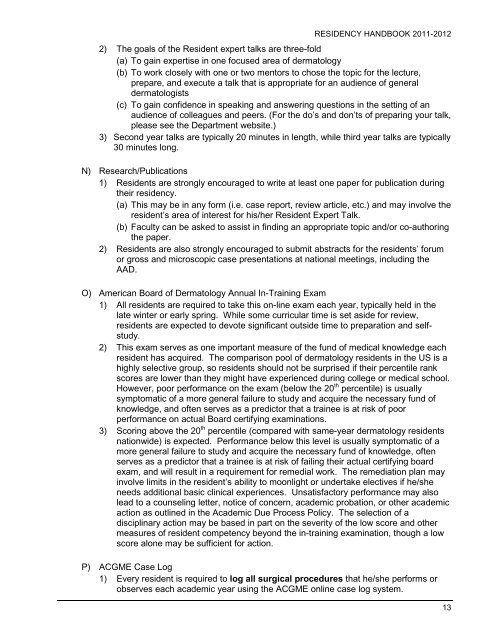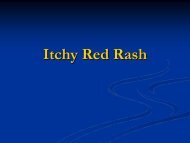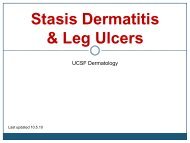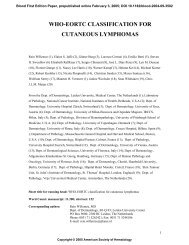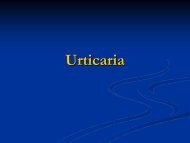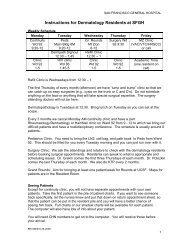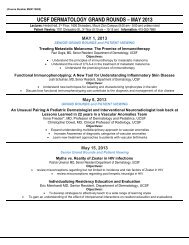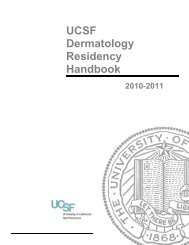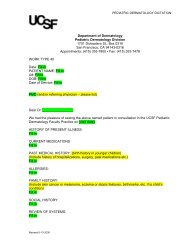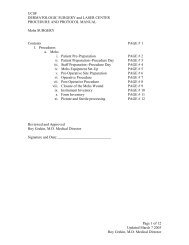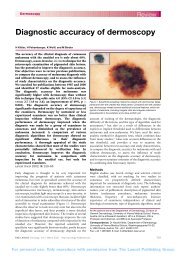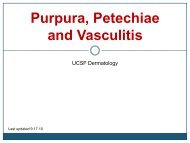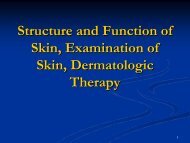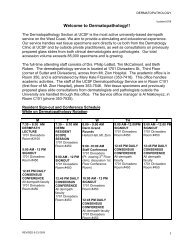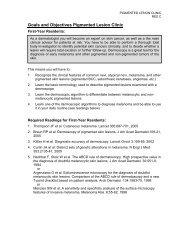UCSF Dermatology Residency Handbook - Dermatology - University ...
UCSF Dermatology Residency Handbook - Dermatology - University ...
UCSF Dermatology Residency Handbook - Dermatology - University ...
You also want an ePaper? Increase the reach of your titles
YUMPU automatically turns print PDFs into web optimized ePapers that Google loves.
RESIDENCY HANDBOOK 2011-2012<br />
2) The goals of the Resident expert talks are three-fold<br />
(a) To gain expertise in one focused area of dermatology<br />
(b) To work closely with one or two mentors to chose the topic for the lecture,<br />
prepare, and execute a talk that is appropriate for an audience of general<br />
dermatologists<br />
(c) To gain confidence in speaking and answering questions in the setting of an<br />
audience of colleagues and peers. (For the do’s and don’ts of preparing your talk,<br />
please see the Department website.)<br />
3) Second year talks are typically 20 minutes in length, while third year talks are typically<br />
30 minutes long.<br />
N) Research/Publications<br />
1) Residents are strongly encouraged to write at least one paper for publication during<br />
their residency.<br />
(a) This may be in any form (i.e. case report, review article, etc.) and may involve the<br />
resident’s area of interest for his/her Resident Expert Talk.<br />
(b) Faculty can be asked to assist in finding an appropriate topic and/or co-authoring<br />
the paper.<br />
2) Residents are also strongly encouraged to submit abstracts for the residents’ forum<br />
or gross and microscopic case presentations at national meetings, including the<br />
AAD.<br />
O) American Board of <strong>Dermatology</strong> Annual In-Training Exam<br />
1) All residents are required to take this on-line exam each year, typically held in the<br />
late winter or early spring. While some curricular time is set aside for review,<br />
residents are expected to devote significant outside time to preparation and selfstudy.<br />
2) This exam serves as one important measure of the fund of medical knowledge each<br />
resident has acquired. The comparison pool of dermatology residents in the US is a<br />
highly selective group, so residents should not be surprised if their percentile rank<br />
scores are lower than they might have experienced during college or medical school.<br />
However, poor performance on the exam (below the 20 th percentile) is usually<br />
symptomatic of a more general failure to study and acquire the necessary fund of<br />
knowledge, and often serves as a predictor that a trainee is at risk of poor<br />
performance on actual Board certifying examinations.<br />
3) Scoring above the 20 th percentile (compared with same-year dermatology residents<br />
nationwide) is expected. Performance below this level is usually symptomatic of a<br />
more general failure to study and acquire the necessary fund of knowledge, often<br />
serves as a predictor that a trainee is at risk of failing their actual certifying board<br />
exam, and will result in a requirement for remedial work. The remediation plan may<br />
involve limits in the resident’s ability to moonlight or undertake electives if he/she<br />
needs additional basic clinical experiences. Unsatisfactory performance may also<br />
lead to a counseling letter, notice of concern, academic probation, or other academic<br />
action as outlined in the Academic Due Process Policy. The selection of a<br />
disciplinary action may be based in part on the severity of the low score and other<br />
measures of resident competency beyond the in-training examination, though a low<br />
score alone may be sufficient for action.<br />
P) ACGME Case Log<br />
1) Every resident is required to log all surgical procedures that he/she performs or<br />
observes each academic year using the ACGME online case log system.<br />
13


